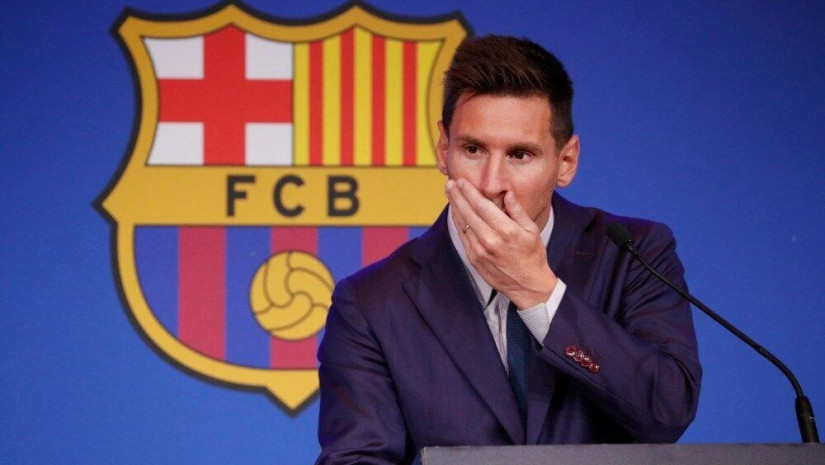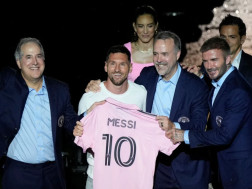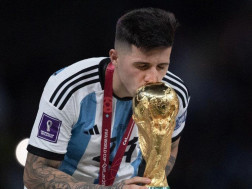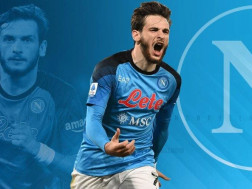A tearful Lionel Messi has said goodbye to Barcelona and looks set to say hello to PSG. His move to Paris lacks imagination, but what it symbolizes about the shifting forces in European football is more significant.
Lionel Messi is perhaps the greatest to ever play the game. We've become numb to his greatness, even though the iconic moments have threatened to make the extraordinary routine, his majesty often taken for granted, DW reports.
He ended his 16-year association with Barcelona at a press conference on Sunday, admitting that he wasn't ready to say goodbye. He said he thought he would stay at the club for his entire career and that he wanted to stay.
"This year, my family and I were convinced we were going to stay at home, that's what we all wanted more than anything," he said, sweeping tears away from his eyes. "We'd always made this our home. We thought we would be staying here in Barcelona. But today, we have to say goodbye to all of this."
Barcelona icon
In a Barcelona career of so many beautiful moments, it's hard to pin down one of them. His genius for one of football's traditional heavyweights has enriched the city he's called home for 21 years and made him a symbol of Catalan pride.
His best moments on the field remain unparalleled but, looking back, already seem sepia-toned. The Messi and Barcelona story already feels like a throwback to an old era, with the club he leaves behind a very different one that he made his debut for in 2005.
More than just about the numbers – his numbers were astounding – Messi is an artist. He arrived in Barcelona as a kid with a dream in 2000. He became an icon. Messi will always be synonymous with Barcelona, regardless of what follows.
PSG move lacks imagination
"I've got nothing confirmed," Messi said. "I have had a lot of calls and a lot of clubs were interested. At the moment, I've not got anything closed, but we are talking about a lot of things."
Messi is keeping his cards close to his chest, but is widely expected to join PSG on a two-year deal. It will be one last throw of the dice that sees him link up with friend, compatriot and soon-to-be coach Mauricio Pochettino. And also his old Barca teammate Neymar, as they and Kylian Mbappe will form a sensational forward line.
But at 34 with his powers waning, does Messi have anything left to prove?
Short of winning the World Cup with Argentina in a crowning glory moment next year, there's nothing that Messi can achieve that would top what he's already done. Why not a move to Marseille, Dortmund or Milan?
Diego Maradona's move to Napoli in 1984, albeit when he was much younger than Messi is now, captured the imagination. A move to one of Europe's secondary clubs would have had a romanticism to it. Instead, Messi's imminent arrival in Paris is more a process of elimination of who can afford the most expensive free transfer of all time. Only Manchester City, a club conglomerated and spat out of the mouths of Abu Dhabi, appear to be likely to compete. Chelsea too, perhaps.
Messi's PSG swansong is not yet signed and sealed, but a move from a superclub in decline to oneon the rise is a significant moment of symbolism. Messi looks set to sign a two-year contract with the new-money superpower, joining another ageing star – his old adversary Sergio Ramos – as the French club go for broke for the Champions League.
Investment funds and oligarchs
Going for broke isn't really the right phrase though, as it implies some sort of risk. PSG aren't risking anything with the signing of Messi, or indeed anyone else they sign. The margins for error are generous in Ligue 1 and any failed signing can be replaced with another with little or no concern over how much any deal costs. Qatar Investment Group's pockets are so deep that only Manchester City can compete.
While City's signing of Jack Grealish for €118m and the possible addition of his England captain Harry Kane are better long-term investments than the acquisition of Messi, none of it really matters. Who would care if not a single Messi PSG shirt was sold? Who would it hurt? Signing Messi is about status more than commerce or even what he does on the pitch.
Unlike the game's traditional power clubs – Barcelona, Real Madrid, Manchester United, Liverpool, Bayern Munich and others – who built on their local and national successes by expanding their appeal to North America and Asia, state-funded clubs don't rely on commercial success or making superclubs a community of which fans feel part.
This approach has been superceded in an era dominated by state-funded investment funds and oligarchs. Barcelona could simply no longer afford to employ its greatest-ever player, with Messi even offering to take a 50% pay cut – it's a state of affairs that a European giant would never have imagined just a few years ago. But this is a new era and only a few can compete.
















